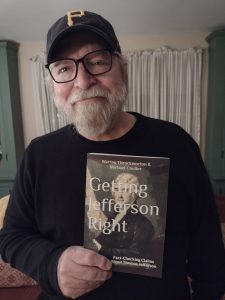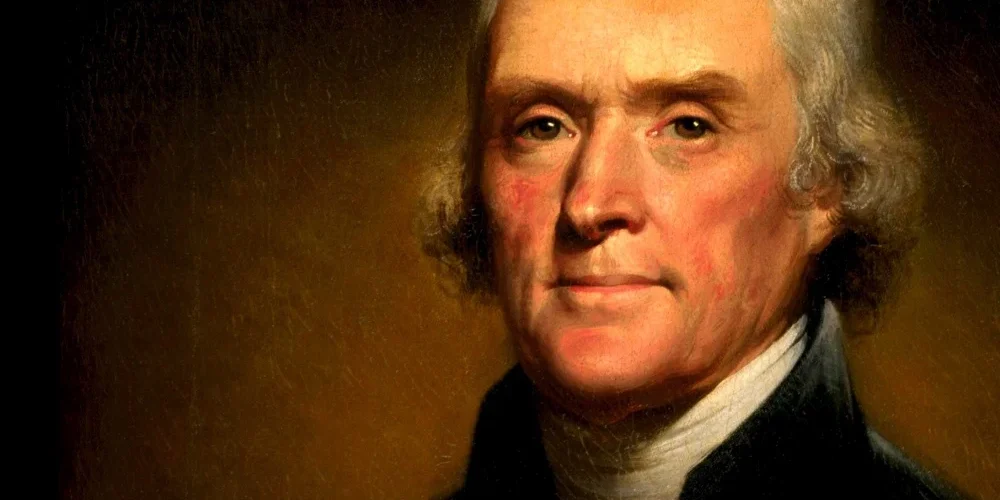Last month, Michael Coulter and I brought out the second edition of our book Getting Jefferson Right: Fact-Checking Claims About Thomas Jefferson. The book was first published in 2012 as a feature-length review of David Barton’s book The Jefferson Lies. In response, Thomas Nelson discontinued publication of Barton’s book in a move that was unprecedented for the Christian publisher.

Warren Throckmorton
This edition is greatly expanded, adding about one-third more content and taking on claims made by other Christian nationalists, such as Eric Metaxas, Robert Jeffress and Stephen Wolfe. In particular, we examine the claims made about Jefferson by Wolfe in his 2022 book, The Case for Christian Nationalism.
What follows is a brief excerpt which examines a claim about Jefferson and church attendance while he was president.
+++++
Even though David Barton often claims he relies on primary sources for his work, this story ranks up there with George Washington’s cherry tree as verified history. Barton tells the story various ways, but we will start with how he relates it in The Jefferson Lies.
Why was Jefferson such a faithful participant at the Capitol church? He once explained to a friend while they were walking to church together: “No nation has ever yet existed or been governed without religion — nor can be. The Christian religion is the best religion that has been given to man and I, as Chief Magistrate of this nation, am bound to give it the sanction of my example.”
As it turns out, this quote about the Christian religion being the best religion cannot be found in any of Jefferson’s correspondence, speeches or the correspondence of anyone who was a contemporary of Jefferson. The Monticello Library fact-checkers have explored all known primary sources for anything close to this quote and found nothing. In fact, it is probably best to let the good folks at Monticello tell the rest of the story:
This quotation appeared in a handwritten manuscript by the Reverend Ethan Allen (1796-1879). The story was related to Allen by a Mr. Ingle, who claimed to have been told a story that Jefferson was walking to church services one Sunday,
“… with his large red prayer book under his arm when a friend querying him after their mutual good morning said which way are you walking Mr. Jefferson. To which he replied to Church Sir. You going to church Mr. J. You do not believe a word in it. Sir said Mr. J. No nation has ever yet existed or been governed without religion. Nor can be. The Christian religion is the best religion that has been given to man and I as chief Magistrate of this nation am bound to give it the sanction of my example. Good morning Sir.”
The story comes to us third hand and has not been confirmed by any references in Jefferson’s papers or any other known sources. Its authenticity is questionable.
“This tale didn’t show up until after Jefferson’s death.”
This tale didn’t show up until after Jefferson’s death. According to Allen, a “Mr. Ingle” told him that some unnamed person told Ingle the story and then Ingle told Allen. Yet, Barton reports this story without informing his readers that “the story comes to us third hand.” Like Washington’s assaulted cherry tree and honest confession, this story appears to be a morality tale. However, Barton repeats it like a modern-day Parson Weems, the storyteller and moralist who made up stories about George Washington to teach lessons to children.
In Barton’s public appearances, the story, now fourth-hand, can get more embellished. On Michael Brown’s Line of Fire radio program in 2016, Barton changed the story a little more, saying:
When he (Jefferson) became president for eight years, he went there at the Capitol. When asked, “Why do you attend church at the Capitol?” he said, “I’m the chief magistrate of this Christian nation and it’s my duty and responsibility to set this example and so Rev. Ethan Allen there in D.C. that’s who, he explained that to him. I’ve gotta make sure people see me going to church at the Capitol.”
Barton adds to story by having Jefferson say he was the chief magistrate of “this Christian nation.” Also, in Barton’s Line of Fire version, Jefferson explained his church-going philosophy to Ethan Allen directly, instead of an unnamed person who then told a Mr. Ingles, who then told Rev. Ethan Allen sometime after 1823 when Allen came to Washington, D.C.
This gets absurd. Ethan Allen was born in 1796 in Massachusetts. By all accounts, he lived his childhood there and didn’t come to D.C. until 1823, long after Jefferson had returned to Monticello and three years prior to Jefferson’s death in 1826. While he was president, Jefferson did not explain anything to a very youthful Ethan Allen.
While this is a little humorous, it also teaches a serious point about sources. Whenever you might be tempted to rely on a second-hand or third-hand source, think about Barton’s fourth-hand telling of this story. Who really knows what Mr. Ingles’ unnamed friend heard or if there was a Mr. Ingles?
Warren Throckmorton is a retired psychology professor at Grove City College and co-author with Michael Coulter of Getting Jefferson Right: Fact Checking Claims About Thomas Jefferson. Learn more at GettingJeffersonRight.com.
Related articles:
Is ‘In God We Trust’ an assertion of Christian nationalism or of American history in public schools?
Speaker Mike Johnson betrays core Baptist value | Opinion by Jennifer Hawks
Advocacy group names 20 ‘false prophets’ of Christian nationalism


